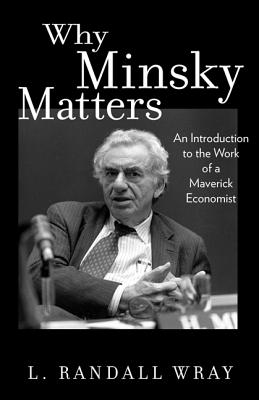

 Princeton University Press
Princeton University Press
Why Minsky Matters: An Introduction to the Work of a Maverick Economist


Key Metrics
- L Randall Wray
- Princeton University Press
- Paperback
- 9780691178400
- 8.4 X 5.4 X 0.9 inches
- 1 pounds
- Business & Economics > Economic History
- English
 Secure Transaction
Secure TransactionBook Description
Perhaps no economist was more vindicated by the global financial crisis than Hyman P. Minsky (1919-96). Although a handful of economists raised alarms as early as 2000, Minsky's warnings began a half-century earlier, with writings that set out a compelling theory of financial instability. Yet even today he remains largely outside mainstream economics; few people have a good grasp of his writings, and fewer still understand their full importance. Why Minsky Matters makes the maverick economist's critically valuable insights accessible to general readers for the first time. L. Randall Wray shows that by understanding Minsky we will not only see the next crisis coming but we might be able to act quickly enough to prevent it.
As Wray explains, Minsky's most important idea is that stability is destabilizing: to the degree that the economy achieves what looks to be robust and stable growth, it is setting up the conditions in which a crash becomes ever more likely. Before the financial crisis, mainstream economists pointed to much evidence that the economy was more stable, but their predictions were completely wrong because they disregarded Minsky's insight. Wray also introduces Minsky's significant work on money and banking, poverty and unemployment, and the evolution of capitalism, as well as his proposals for reforming the financial system and promoting economic stability.
A much-needed introduction to an economist whose ideas are more relevant than ever, Why Minsky Matters is essential reading for anyone who wants to understand why economic crises are becoming more frequent and severe--and what we can do about it.
Author Bio
Senior Scholar L. Randall Wray is a professor of economics at Bard College. His current research focuses on providing a critique of orthodox monetary theory and policy, and the development of an alternative approach. He also publishes extensively in the areas of full employment policy and, more generally, fiscal policy. Wray’s most recent book is A Great Leap Forward: Heterodox Economic Policy for the 21st Century (Academic Press, 2020).
Wray is the author of Money and Credit in Capitalist Economies: The Endogenous Money Approach (Edward Elgar, 1990), Understanding Modern Money: The Key to Full Employment and Price Stability (Edward Elgar, 1998), The Rise and Fall of Money Manager Capitalism: Minsky’s Half Century from World War Two to the Great Recession (with É. Tymoigne; Routledge, 2013), Modern Money Theory: A Primer on Macroeconomics for Sovereign Monetary Systems (Palgrave Macmillan, 2012; 2nd rev. ed., 2015), Why Minsky Matters: An Introduction to the Work of a Maverick Economist (Princeton University Press, 2016), and Macroeconomics (with W. Mitchell and M. Watts; Red Globe Press, 2019). He is also coeditor of, and a contributor to, Money, Financial Instability, and Stabilization Policy (Edward Elgar, 2006) and Keynes for the 21st Century: The Continuing Relevance of The General Theory (Palgrave Macmillan, 2008).
Wray taught at the University of Missouri–Kansas City from 1999 to 2016 and at the University of Denver from 1987 to 1999, and has been a visiting professor at the Universities of Paris and Rome (La Sapienza). He holds a BA from the University of the Pacific and an MA and a Ph.D. from Washington University, where he was a student of Minsky. He has recently completed a Fulbright Specialist Grant at the Tallinn University of Technology in Estonia.
Source: Levy Economics Institute of Bard College
Videos
No Videos
Community reviews
Write a ReviewNo Community reviews